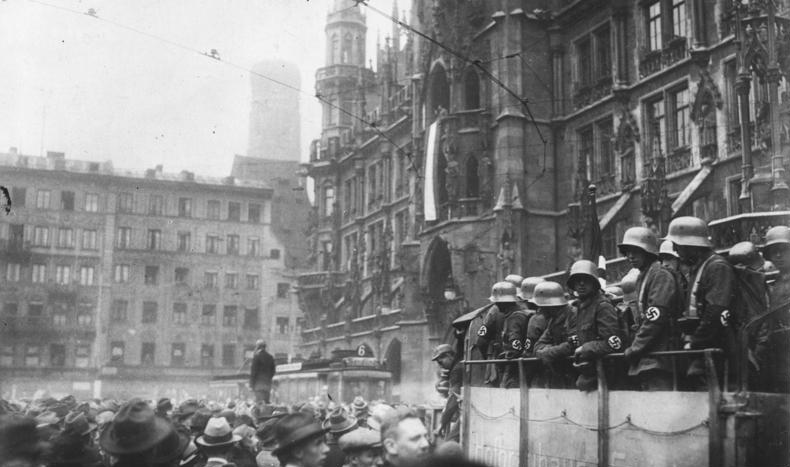Note: If you wish to receive, via e-mail, (1) my weekly newsletter or (2) daily copies of these posts, notify me at [email protected] and indicate which you would like. I promise not to share your e-mail address with anyone. To unsubscribe, send me a follow-up email.
Thursday
Today is the 100th anniversary of Hitler’s Beer Hall Putsch, an attempted coup that bears an unsettling resemblance to Donald Trump’s January 6 insurrection. Although Hitler was arrested and imprisoned for treason, his failed coup brought him to the public’s attention, and he was eventually able to turn that failure into spectacular success. Trump’s fascist followers like Steve Bannon and Stephen Miller are hoping that Trump can follow the same playbook.
In the 1923 coup attempt, 2000 Nazis marched on a Munich war memorial. Sixteen of them were killed, along with four policemen and one bystander. Hitler only spent nine months of his five-year sentence in jail (he used the time to write Mein Kampf) before being released, at which point he entered electoral politics. Which of course is what Trump did following his own coup attempt.
Playwright and poet Bertolt Brecht saw Hitler for what he really was from the very beginning. I think of his poem “When Evil-Doing Comes Like Falling Rain” as I watch the mainstream media struggle with how to cover Trump: does it continue to remind us that he attempted to overthrow the government or does it cover this election like any other. Will it point out, relentlessly, that Trump plans to do what Hitler did upon ascending to power, which was suspend the German constitution and go after his enemies? Or will it treat Trump as any other GOP politician?
As in “When Evil-Doing Comes Like Falling Rain,” the media would find its task easier if Trump were guilty of only one or two things. Then it could duly report the scandal and the public could raise its “cry of horror.” The New York Times found it easy to focus on Hillary Clinton’s e-mail scandal, even though in the end it came to nothing. But what does it do in the face of Trump’s outrageous lies and fraudulent real estate practices and money laundering and tax scams and Russian collusion and documents theft and dodgy businesses and dodgy charities and sexual assaults and racist behavior? What does it do when he is charged with 91 felony crimes, in addition to various civil crimes, and when he threatens judges, prosecutors, witnesses, etc.—and when people carry out his threats with threats of their own, and sometimes violence?
This is the situation Brecht describes in his poem. The one who brings the letter, the one who seeks to warn, the one asking for sympathetic attention, the one bleeding from wounds, and the one who finally reports to the authorities are all versions of people asking us to wake up to Hitler’s (and for us, to Trump’s) impending fascism.
And what is the effect of our cries? Brecht replies,
When evil-doing comes like falling rain, nobody calls out “stop!”
Here’s the poem:
Like one who brings an important letter to the counter after office hours: the counter is already closed.
Like one who seeks to warn the city of an impending flood, but speaks another language. They do not understand him.
Like a beggar who knocks for the fifth time at the door where he has four times been given something: the fifth time he is hungry.
Like one whose blood flows from a wound and who awaits the doctor: his blood goes on flowing.
So do we come forward and report that evil has been done us.
The first time it was reported that our friends were being butchered there was a cry of horror. Then a hundred were butchered. But when a thousand were butchered and there was no end to the butchery, a blanket of silence spread.
When evil-doing comes like falling rain, nobody calls out ‘stop!’
When crimes begin to pile up they become invisible. When sufferings become unendurable the cries are no longer heard. The cries, too, fall like rain in summer.
I get that people don’t want to think about the threat of fascism all the time. Brecht himself was aware of the toll such focus takes. In “A Bad Time for Poetry,” he says he’d rather be enthusiastic about “the blossoming apple tree,” but instead must write about “the housepainter’s speeches.” The housepainter, incidentally is Hitler, who as an artist painted pictures of houses.
A rhyme in my song
Would seem almost wanton.
Inside me contend
Enthusiasm at the blossoming apple tree
And horror at the housepainter’s speeches.
But only the latter
Drives me to write.
Perhaps the media can only express so much horror before we become inured to it, as we become inured to heavy rain. But the only thing it should never do, as the German media should never have done with Hitler, is describe Trump as anything other than a law-breaking insurrectionist and wannabe fascist dictator.
